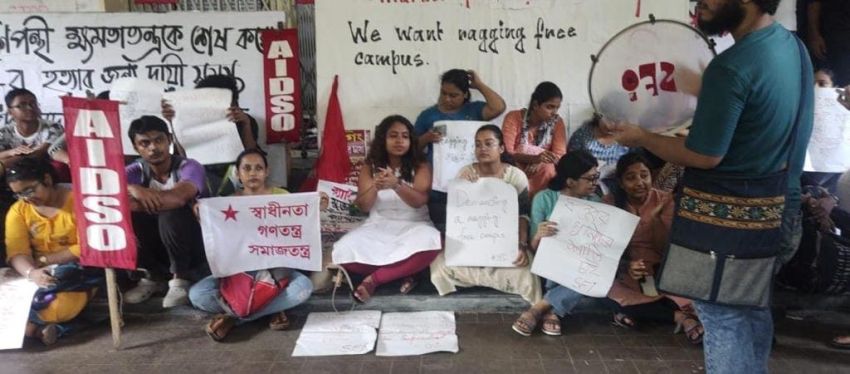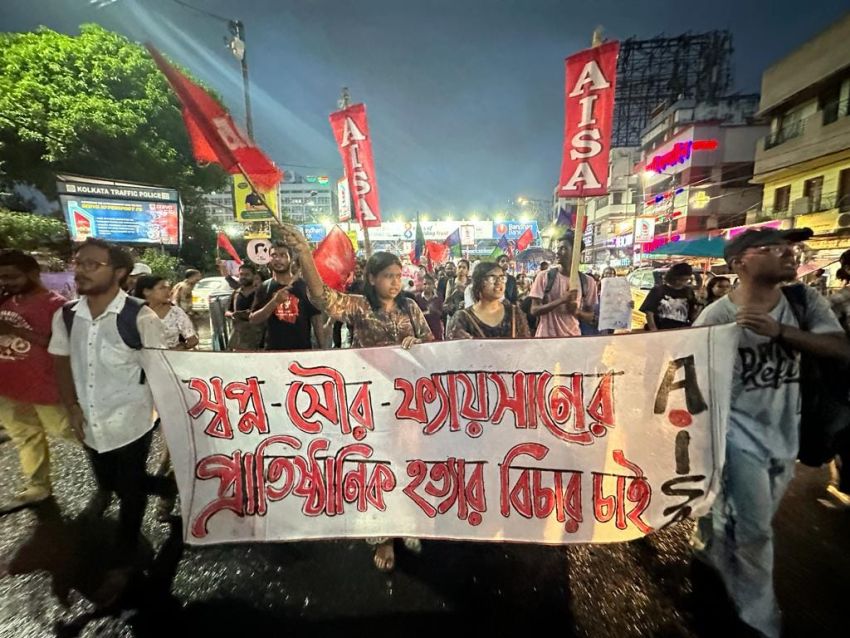The first week of university is an exciting time for any student. The beginning of a new phase of life; a chance to learn, rebel, make friends and explore your identity.
Tragically, it was cut short for Swapnadeep Kundu, who was halfway through his first week at Jadavpur University (JU) in Kolkata, West Bengal, when he committed suicide on August 12.
Residing at one of the university’s hostel accommodation blocks (dormitories), he was a victim of extreme hazing rituals, known as “ragging”, by senior students. Disturbingly, ragging is common practice at Indian universities.
Swapnadeep, who was from the small town of Bagula, about three and a half hours from Kolkata, was only 18 years old. He had attended his first classes only days earlier.
In response to the tragedy, JU students responded swiftly, gathering in numbers on campus to demand an investigation into the incident.

Ragging 'normalised'
Ipil Monica Baski, a postgraduate student in the English department and member of the All India Students’ Association (AISA) at JU, told Green Left that Swapnadeep was a victim of “intensive ragging” which forced him to “take this major step”.
“A lot of institutions still have ragging of younger students,” Baski explained. “We have tried to talk to the authorities … but no sort of immediate action has been taken.
“The culture of ragging is extensively practiced in faculties like Engineering and also in the hostels.
“Not so much at the hostels inside the campus but, for example, this incident that took place happened in the Jadavpur main hostel which is only five minutes away from the main university.
“A lot of ragging has taken place over the years … it has been normalised.
“AISA is totally anti-ragging, we have always stood against this kind of culture, we have campaigned against it and tried to organise workshops to create awareness among students.”
Students initiated protests demanding justice for Swapnadeep. They are also boycotting classes and have initiated a sit-in, pledging to stay at the campus until their demands are met. At the time of writing the sit-in had continued for four days straight.
“The students are very angry,” Baski said. “The moment the news came out, just after the incident happened, students rushed into the hostels and a lot of students protested.
“We are still now doing that, we are talking to the authorities, writing deputations … we want justice for this person and also to end this disgusting culture that is still rampant and exists here in Jadavpur and at other institutions.
“A lot of departments have boycotted their classes, a lot of professors and [Heads of Departments] are working with us and are a part of our protest.
“Everyone is very, very angry right now.”

Student demands
Another student and AISA member, Rakesh, told GL that students are demanding that the Anti-Ragging Cells, which they say have been ineffective, be made up of directly elected representatives. They are also demanding the implementation of a Gender Sensitization Committee against Sexual Harassment (GSCASH) and for the full investigation report to be released publicly.
“What do campus Anti-Ragging cells do? The committee is basically invisible,” an AISA statement said. “There is no relation with the students, there is no elected representative, the effort to create awareness is zero.
“From 2012, AISA has repeatedly demanded a GSCASH election from the university authorities … Authorities have failed to resolve any incident due to no gender awareness committee on the campus at present.”
The JU Faculty of Engineering and Technology Students’ Union (FETSU) released a statement on August 16 classifying the death as “institutional murder that has occured due to ragging”.
“FETSU strictly stands against any form of ‘Ragging Culture’ prevailing in the campus … FETSU will take all the necessary steps to abolish the ‘Ragging Culture’ from campus and hostel premises.”
Kolkata's Police Commissioner Vineet Kumar Goyal said on August 13, that three people, including two students and one former student, had been arrested in connection with Swapnadeep's death. They were all present at the hostel when Swapnadeep fell from the second floor.
“Yes a few have been arrested, but does that lead to justice?” the AISA statement said. “Will 'ragging' be just another 'crime' or do we talk about the power structure behind it?
“Statistics show that hundreds of student suicides have surfaced in the past 5 years at IITs [Indian Institutes of Technology], medical colleges and other educational institutions across the country. Thousands of students have abandoned their studies."

Right-wing attacks
The statement highlighted the link between ragging culture and the violent Islamophobia and casteist culture that is being propagated by Narendra Modi’s ruling Bharatiya Janata Party (BJP) and the Hindu Nationalist Rashtriya Swayamsevak Sangh (RSS).
“The incident at Jadavpur is not an isolated incident … BJP-ruled states are on top in ragging incidents.
“There is a system of reactive power in colleges and universities that are causing these ragging events … some powerful students know that [they can get away with] torture on first year students emerging from the marginalised parts of society,” the statement said. Swapnadeep was a dalit, the most marginalised in India's caste system.
“Removing right-wing politics from the campus is currently one of the responsibilities of united student politics. We are seeing how parties like the Akhil Bharatiya Vidyarthi Parishad (ABVP, the student wing of the RSS) are using the incident to attack leftist politics.”
Members of the ABVP attempted to enter the university on August 11, staging a rally outside the main entrance of the campus under the pretence of protesting for justice. JU students barricaded the main gate to block their entry.
These attacks have continued: “There have been attacks on our comrades, death threats … outside the uni, at the bus stop, if [students] walk past they are being verbally abused, threatened,” one student and AISA member told GL.
ABVP members attacked JU in 2019 — burning down the student union offices, ransacking classrooms and attacking students and onlookers — after students protested against BJP MP Babul Supriyo entering the campus. In response, thousands of students from JU and other universities marched to defend the campus from BJP and ABVP attacks.
“Many first and second year students are scared, they don’t know how it works so are a bit scared to come out to the protests, and their parents are scared too,” the student said.
“Since the death, most of the first year students are home … we also heard some people withdrew their admission from the university.
“The boy who just passed away was really young,” Baski said. “It was just two days he was at the university, his college life did not even start.
“It’s people's dream to come and study here and the fact that he came from the suburbs to study here and fulfil his dream and to not even have a proper day to experience what life at Jadavpur feels like is very, very sad.
“Things are getting pretty tough here, but we are still fighting. We need every student of the university to join us.
“We must stop ragging in every institution.”
[Follow AISA-Jadavpur University Unit on Facebook for updates.]